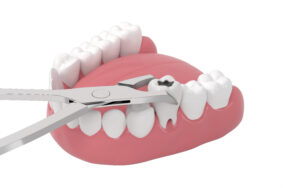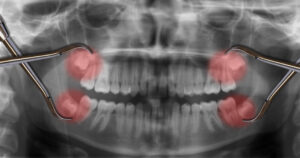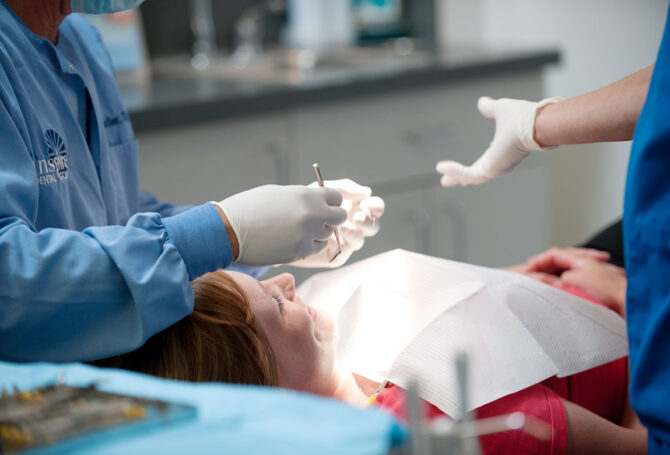Oral Surgery Specialists in Western New York
Meet Our Surgeons
What is Oral and Maxillofacial Surgery?
Some of the most common surgeries include:
• Impacted teeth/wisdom teeth
• Gum graft
• Dental Implants
• Maxillofacial surgery
• Jaw and teeth repair following an injury
Frequently Asked Questions

Our dentists will use every measure to prevent tooth loss, but sometimes a tooth extraction is still necessary. This might be the case when a tooth is too badly damaged to repair, a baby tooth doesn’t fall out on its own, more room is needed for teeth to move during orthodontic care, or a tooth is too far out of alignment to be corrected.
Before a tooth is removed, the dentist will take an x-ray to understand the shape and position of the tooth and surrounding bone. For a simple extraction, we will first apply a local anesthetic to prevent pain and discomfort. After the procedure, we will provide care instructions to alleviate discomfort and ensure proper healing.
Reasons For Tooth Extractions:
- A crowded mouth
- Infection
- Risk of infection

Wisdom teeth are the last molars, or “third molars,” that develop on each side of the jaws. Wisdom teeth usually emerge in the back of the mouth between the ages of 16-20.
Wisdom teeth are a valuable asset to the mouth when they are healthy and properly positioned. But when the jaw isn’t large enough to accommodate wisdom teeth, they can become impacted (unable to come in or misaligned). Wisdom teeth may also grow in sideways, emerge only partway through the gum or remain trapped beneath the gum and bone. These are all common issues that require wisdom tooth removal.
A wisdom tooth extraction is a relatively routine procedure. The dentist will numb the area in your mouth with local anesthesia or use IV sedation so you are asleep during the procedure. After the tooth is removed, we will provide care instructions to ensure proper healing.
As wisdom teeth begin to erupt, your dentist will be monitoring your mouth for the following signs:
- Wisdom teeth that are not in the right position can allow food to become trapped which allows bacteria to grow and cavities to form.
- Wisdom teeth that have not come in properly, which can make it difficult to floss.
- Wisdom teeth that have partially come through can give bacteria a place to enter the gums and cause infection. This can also cause pain, swelling, or stiffness in our jaw.
- Wisdom teeth that do not have room to come through may crowd or damage neighboring teeth
- A wisdom tooth that is impacted can form a cyst near the impacted tooth, this could damage the roots of nearby teeth or destroy the bone.
Best Foods to Eat
Following a wisdom tooth extraction, it’s common to wonder about suitable post-removal diet options. Your dentist may recommend nutrient-rich, soft foods, and it’s important to use their dietary advice. Additionally, we’ve compiled a list of foods to support your recovery after wisdom tooth extraction:
Avocado: Easily chewable and rich in healthy fats, vitamins, and minerals, avocados are an excellent choice to obtain essential nutrients during your recovery from oral surgery. It’s crucial to include them in your post-surgery diet for optimal healing.
Cucumber Slices: Opting for cucumber slices is a beneficial choice due to their cooling, hydrating properties, and mild taste. In addition to consuming them, you can also experience temporary relief by placing chilled cucumber slices on the outer cheek near the extraction site.
Sweet Potatoes: Rich in vitamins A and C, as well as dietary fiber, mashed sweet potatoes are an excellent choice for meeting your nutritional requirements after oral surgery.
Spinach: Abundant in vitamins A, C, and K, spinach stands out as a super food that should be included in your post-wisdom teeth removal diet. With its iron and folate content, consider incorporating spinach into your meals through soups and smoothies.
Tofu: Rich in vital amino acids, tofu is abundant in protein and supports the recovery process.
Scrambled Eggs: Scrambled eggs serve as an excellent protein source, aiding in the recovery process. Incorporating them into your diet can significantly contribute to supplying your body with vital, energy-boosting nutrients.
Salmon: Salmon stands as a crucial nutrient powerhouse that fosters healing effectively. With its anti-inflammatory properties, it proves to be an excellent inclusion in your diet. As an abundant source of omega-3 fatty acids, it provides your body with high-quality protein, supporting the healing process.
Blueberries: Brimming with antioxidants and vitamins C and K, blueberries not only add a delightful flavor but also assist in flushing out toxins from your body. Incorporating them into post-wisdom teeth removal diets is ideal and blending them into smoothies offers a convenient option. Alternatively, you can enjoy them as soft fruits.
Bananas: Incorporating mashed bananas into your diet is an excellent method to provide nourishment to your body following wisdom teeth extraction.
Applesauce: This soft and pureed fruit is easily consumable and gentle on the mouth.
Greek Yogurt: Greek yogurt serves as a protein and calcium-rich option that is also smooth and easily consumable, making it a fitting choice for the post-surgery period.
Oatmeal: Gentle on the digestive system, prepared oatmeal is highly beneficial for recovery after surgery. Choose a smoother consistency and avoid adding nuts or dried fruits.
Fruit-Infused Water: For a revitalizing touch, enhancing water with fruits such as lemon, cucumber, berries, or mint can introduce flavor and offer extra nutrients. These infused waters present a flavorful choice for staying hydrated during the recovery period.
Coconut Water: As a naturally electrolyte-rich drink, coconut water can assist in maintaining hydration. It includes vital minerals such as potassium, magnesium, and sodium, which contribute to restoring electrolyte balance and rehydrating the body.
Ice Cream: Following the removal of wisdom teeth, indulge in ice cream to provide soothing relief to your swollen gums and aid in reducing the inflammation around the surgical site.
Protein Shakes: If you find yourself not in the mood for solid foods, opting for protein shakes can assist in meeting your body’s nutritional needs.
Soups: Soup provides nourishment and a rich array of essential nutrients, encompassing vitamins and minerals. Moreover, their elevated water content renders them hydrating and advantageous for the recovery process.
Bone Broth: Abundant in collagen and amino acids, bone broth serves as a nutrient powerhouse, enhancing the healing of wounds. With its gentle impact on the stomach, it becomes an ideal food choice to support recovery following wisdom teeth removal. If chewing poses discomfort, consider sticking to bone broth.
Foods to Avoid
Following the removal of your wisdom teeth, it’s crucial to adhere to a soft and gentle diet for a few days to facilitate the healing process and minimize the risk of complications. Here are some foods to steer clear of:
Hard and Crunchy Foods: Such items can cause significant irritation to the surgical area and may potentially disrupt the formation of the blood clot, resulting in a painful condition known as dry socket. Refrain from consuming items like chips, nuts, popcorn, and raw vegetables.
Spicy foods: Surgical sites can be irritated by spicy foods, potentially causing discomfort. It is advisable to abstain from consuming spicy dishes for a few days.
Acidic Foods and Beverages: The surgical area may be irritated by acidic foods and beverages, including citrus fruits and juices, potentially impeding the healing process, and causing discomfort on open wounds.
Hot Foods and Beverages: Consuming hot foods and beverages may enhance blood flow to the surgical area, potentially resulting in bleeding. Opt for lukewarm or cold items instead.
Alcoholic Beverages: Alcohol has the potential to disrupt the healing process and may have adverse interactions with any prescribed pain medications. It is recommended to refrain from consuming alcohol until you have fully recovered.
Tobacco Products: Engaging in smoking or using smokeless tobacco can impede the healing process and heighten the risk of complications. It is advisable to abstain from all tobacco products for as long as possible following the removal of wisdom teeth.
Straws: Utilizing straws can generate suction in your mouth, potentially dislodging the blood clot and elevating the risk of dry socket. It is advisable to refrain from using straws for at least a week after the surgery.
Curious about the timeline for reintroducing solid food after tooth extraction? The answer lies in receiving approval from your dentist. While soft or semi-solid foods are acceptable in the initial 24 hours post-surgery, it’s advisable to refrain from hot and spicy options until authorized by your doctor.
Keep in mind that integrating the recommended foods can expedite your wisdom teeth recovery and enhance your overall bodily strength.
A dental implant is a substitute tooth root that serves the same function as a natural tooth root. We have specially trained oral surgeons who are here to help you invest in your long term oral health. Learn more here.






